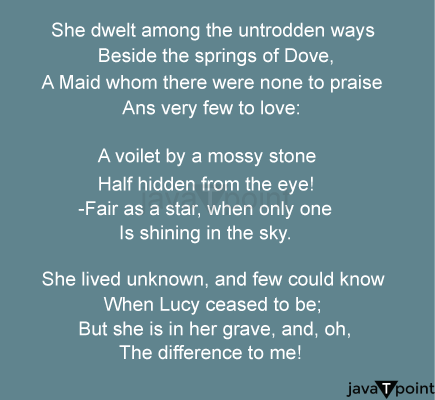She Dwelt Among the Untrodden WaysSummary"She Dwelt Among the Untrodden Ways" is a 12-line song composed in 1798 by romantic poet William Wordsworth, one of the founding pioneers of the English Romantic movement. This poem, which was included in his book "Lyrical Ballads" and first published in 1800, explores the concepts of loneliness, overlooked beauty, and unspoken love. The poem is written by an unnamed speaker who laments the death of Lucy, a young woman who passed away in the English countryside & whose beauty and purity were missed throughout her lifetime. She resided in a rural area of central England at the source of the Dove River, where few people ever ventured. She was a young, single lady who didn't receive the love and respect she deserved throughout her life. It was difficult to completely observe and understand her since she was like a tiny violet next to a large mossy stone; as a result, her delicate beauty was frequently hidden by bigger, more visible objects. She was just as lovely as a star that shines alone in the night sky. Few people knew this young woman, Lucy, after she passed away since she was unknown to them when she was alive. Nonetheless, she is no longer alive and has been buried in the dirt, significantly impacting the speaker. AnalysisIn "She Dwelt among the Untrodden Ways," an unnamed speaker remembers Lucy, a stunning lady who passed away early in the English countryside and was unjustly ignored. Despite the fact that, in the speaker's words, "She lived unknown," Lucy had a quiet, mystic character that was a part of her whole nobility. The speaker said that Lucy mattered in life and still matters in death, even though most people couldn't care less about her. The poem implies that admiring a virtue like Lucy's is desirable even when its audience is small since it may have an everlasting emotional impact. 
Stanza 1 The 1st stanza demonstrates that, despite her anonymity, Lucy deserves affection and appreciation. The poem's title and first line?"She dwelt among the untrodden ways"?create an atmosphere of isolation and distance. Her "ways," or the area where she resided, were "untrodden," meaning few people passed them. And she "dwelt" there, suggesting that she seldom ever left her home base. She had little possibility of running into anyone else because of this. "There was no one to praise" and "very few to love" her because of this. This stanza prepares the reader for the poem's recurring themes of seclusion and unseen beauty. It provides a picture of an unwanted and unacknowledged young lady living in a lonely place, laying the groundwork for the poem's melancholy mood. Stanza 2 The speaker continues by demonstrating her morality endured despite not having any listeners. The speaker shows how her morals are held up without any listeners. The woman is described by the speaker using a metaphor. She is represented as a modest and unassuming presence, like a delicate violet flower blossoming next to a moss-covered stone. Once more, the speaker seems to be in love with Lucy. Trying to understand Lucy's virtue was enjoyable, possibly because it was beyond comprehension or "Half hid." It took a lot of efforts to discover or even go close to finding it. Lucy was also "Fair" as the first star to rise in the evening sky. Lucy is fair or lovely because she is separated and hence special, just like the star, which is likely a reference to the goddess, who stands for beauty and love. She glows when no one else can, indicating a remarkable ability. And she continued "shining" even as she remained unrecognized. The speaker asserts that Lucy's virtue was strong and excellent and ultimately remembered by highlighting these facets of her morality?her subtle beauty, mystique, and continual shining despite having no audience. Stanza 3 In the last stanza, the speaker muses on the impact of the woman's death and the value of her memory. The line, "The difference to me!" highlights the speaker's emotional connection to the woman and the effect her absence has had on him personally. It implies that the speaker's life has changed significantly due to her death, conveying a strong sense of loss and desire. It emphasizes the woman's physical separation from the rest of the world. It emphasizes the distinction between the living and the dead and accepts the finality of death. The poem's final stanza explores the speaker's unique reaction to the woman's passing. It underlines the psychological effects of her absence, considers the restrictions of death & the grave, and highlights the significance of keeping the woman's memory alive through the picture on her burial monument. ConclusionIt is sad and reflective poetry. It describes a young woman who lived by herself in an unfamiliar place. She didn't have many admirers or friends. The poem demonstrates how her existence was overlooked and how few people were aware of or concerned about her death. In the poem, the speaker conveys their profound sorrow and how much they miss her. The poem's final stanza discusses her burial and how it preserves a memory of her. The poem serves as a gentle reminder to see and cherish the beauty in those who might go unnoticed by others. It prompts us to reflect on the value of relationships and the influence that others may have on our lives, even if they go unnoticed by the world.
Next TopicSong of Hiawatha Summary
|
 For Videos Join Our Youtube Channel: Join Now
For Videos Join Our Youtube Channel: Join Now
Feedback
- Send your Feedback to [email protected]
Help Others, Please Share









